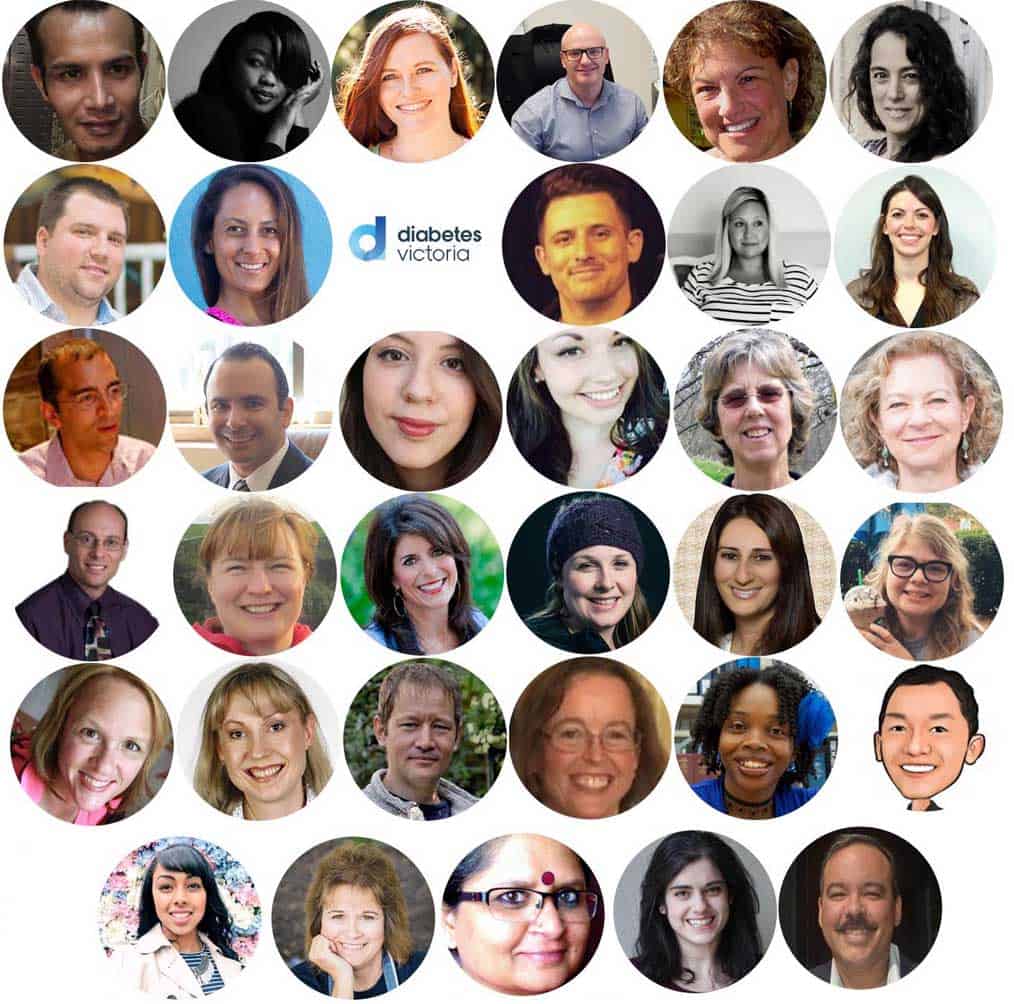Writing is not everyone's strongest feat. Those who can convey a story, a lesson learnt, or a memoir through their writing are not only storytellers but also educators.
Bloggers and advocates who write about diabetes are just that. Through their stories and experiences, they share with us a vulnerable part of them in order to get a message across just in case it can help someone else who may be in their shoes. Its their way of saying "you are not alone in your journey!".
We reached out to 34 amazing bloggers and advocates of diabetes to share with us their thoughts and to invite readers into the world of ideas, thoughts, and personal sphere. They share with us their hardest diabetes related topic they had to write about, some of the techniques they use to draw reader's interest, and some equally interesting comments and questions they have gotten in the past about their articles. All these bloggers have a main goal: to raise awareness and to educate us about the journey one is on with diabetes.
Three questions we asked them:
- What is the hardest diabetes blog subject that you had to write?
- What are some of the best techniques that you use in order to create a story to draw the reader in, and also help keep their attention while they learn about diabetes?
- What are some of the most interesting comments or questions that you have had in relation to your articles about diabetes
[accordions id="6291"]
1. Holly Clegg

A1: It can be challenging having people understand there is no magical diabetes diet…people have a hard time believing that they can enjoy their favorite foods as long as they substitute ingredients and keep it within moderation and within your dietitian recommended healthy meal plan. Just straightforward healthy lifestyle changes, moderate sugar, fat, and portion control. In fact, in all of my cookbooks, every recipe includes nutrition facts and diabetic exchanges, and my newest 3 cookbooks include a ‘D' for every recipe that fits into the American Diabetes Association standards to highlight diabetic-friendly recipes. “I wanted to infiltrate diabetic- friendly recipes throughout a mainstream cookbook to prove everyone can enjoy the same food.”
I advise reading the following articles:
- 28 Experts Answer Questions About Diabetes T2 & Prediabetes
- 14 Reasons Why Most Diets Fail
- How Will the FDA Approval of the Artificial Pancreas Change the Lives of Those Living with Type 1 Diabetes?
- If I Have Diabetes, Will I Have to Stop Eating Sugar?
- 13 Tips to Help You Step off the Diet/Riot Roller Coaster
A2: I create familiar easy recipes with everyday ingredients and I take my own photos. My photograph style is not elaborate but it is “real” and how the recipe will actually look when someone makes it. No fake food styling here! I am relatable in all aspects of my cookbooks from one stop shopping to food photos.
A3: One of my favorite comments was about my Diabetic Cooking cookbook, with the ADA. An email from a man in NYC said he wished that the word ‘diabetic' wasn't on the cover, because he wanted more people to use the book- that's how delicious he thought the recipes were. Eating healthy, diabetic- friendly foods can have a stigma of not tasting good, but that's not true! I love cooking and creating diabetic recipes for my family to entertaining—it's the way to eat whether you are diabetic or not.
2. Atim

A1: The subject in itself was not difficult it was communicating in the context of Nigerian food. Nigerian foods are carbohydrate and starch heavy. Rice, cassava, yams and plantains are considered staples and are consumed across all the social classes of Nigeria in similar amounts. Traditionally, our proportions of carbohydrate to proteins and vegetables is 3:1 which means no matter who you are, your carbohydrate content is heavy. Therefore, speaking in a blog post to Nigerians about diabetes preventions and dietary swaps always proves difficult as it poses the question “so what would I eat?” Unfortunately for a lot of Nigerians, there is a huge cultural attachment to their food which does not allow for a lot of manipulations in portion sizes and dietary swaps.
A2: The strategy I used for World Diabetes day was to create a video campaign on Instagram for people to workout with a watermelon. They were asked to do lunges with a watermelon for one minute and see how many they could do. The other side was to ask them to share recipes they thought would be diabetes friendly. This way it was less about me telling them what to do and them creating awareness through a fun video and thinking through possible recipes that would be useful for a diabetic patient.
A3: There were some people that did not know about local ingredients that were not as starch heavy and very compliant with a low glycemic index meal plan. This was an opportunity for them to find out great alternatives which they were grateful for. There were some people that shared what worked for them in their experience in dealing with the disease. This helped other followers learn from real life people also it helped validate what I was talking about in the posts. In terms of questions, people wanted to know what recipes they could make that were interesting and preventive (lowers blood sugar) they also wanted to know how to avoid gestational diabetes.
3. Laddie Lindahl

A1: The hardest subjects to write about on my blog are the current advocacy hot topics. A lot of the time is because I just don't want to write on the subject but feel that I should make my voice heard. Other times my views are just not as strong and emotional as other bloggers and I think that my post won't have much impact. Sometimes I just don't know what I is right and wrong because I can see both points of view. One thing I have learned is to always use the words “in my opinion” or “I think” and not attribute my opinions to the larger diabetes community. I can talk about “my diabetes” but writing about “your diabetes” or “his or her diabetes” usually gets me in trouble.
A2: I am not always an expert at knowing which of my blogposts will get the most reads and shares across the diabetes online community. Occasionally I will work hard over several weeks to write an educational series about something like heart disease and women with diabetes. I think it is top-notch and it doesn't get the attention that I think it deserves. Other times I will take an hour, flippantly write diabetes and Mickey Mouse, and get a huge response. Purely looks at stats, my most-read blogposts are diabetes tech reviews on insulin pumps and CGMs. Without fail, blogposts with my dog as the guest author make a big impact.
A3: The most interesting comments that I have had on a blogpost were in response to a collaborative post I wrote with a Type 2 friend addressing weight. The discussions were thoughtful and showed a willingness to listen and learn from each other. The diabetes blogosphere has changed in recent years and there are many fewer comments on blogposts. Most of the discussions are happening on Facebook, Twitter, and other social media.
4. Ellie Huckle

A1: I would say one of the hardest diabetes blog subjects I had to write was when I was in hospital for 2 and a half weeks because I had terrible control of my diabetes. It was very raw and a vulnerable post I would say, because I was trying to show everyone my feelings and explain them all but I had barely made sense of them myself. It was also at a time where I was having a real reality check and it was difficult to get everything out that I wanted to say.
A2: I'm not sure I have a specific technique, I think for me the best approach is making it personal. People like hearing real, raw stories about things and I think as a teenager with Type 1 I've always had a perspective that people find interesting and so I've taken that and made my blog personal, it's my personal story but I'm raising awareness of Type 1 and people are learning about it at the same time.
A3: I think the most interesting comments or questions that I've had in relation to my articles about diabetes are probably those from people who tell me how my blogs have helped them or how my blogs have taught them about Type 1. Another thing I seem to find quite interesting, but also annoying, is the amount of comments I've had about people trying to sell natural cures and remedies for diabetes, it's just insane that in this day and age people still think that's a thing. People with Type 1 Diabetes need insulin or they'll die, that's the bottom line!
5. Adam Kennedy

A1: The hardest diabetes subject we find to write about is diabetes symptoms. There are many factors that can take place with symptoms and causation can sometimes be very broad. We also believe that majority of people who are reading up on diabetes symptoms are either newly diagnosed or experiencing new conditions, in which both cases are sensitive and we set the tone of the content to reflect that.
A2: We use a Q & A format for all of our information. We put the quick go to answer at the top of the page and we create several easy to digest analogies to keep our users engaging. By providing these analogies we help our users visualize whatever it is they are learning about rather than just providing them with technical lingo. We write for everyone.
A3: We covered a lot of the basic questions people ask, however, from time to time we get asked very unique questions. Here's the most recent:
Having great success managing sugar levels with exception of 2 hours after breakfast. Even with super high protein breakfast (just two eggs) my sugar level goes from ~90 fasting to 190-220. I do take Metformin and Glimipride with breakfast. All other meals under control.. Could it be the medication driving my liver to produse glucose?
6. Gary Scheiner

A1: I was once asked to write about whether or not people with diabetes should or should not be offended when people use the term "diabetic". This is such a personal issue. Although "diabetic" is part of today's vernacular, the "politically correct" term is "person with diabetes". Nevertheless, I have never been offended being referred to as a diabetic. In fact, it makes me proud to be part of a large and powerful group who manages to achieve great things while battling a challenging chronic illness.
A2: Keeping a sense of humor always helps. Not that diabetes is funny, but the situations that arise as a result of living with diabetes can be very humorous -- such as how long some people use their lancets, or the truly odd behaviors that sometimes occur when a low takes place. I also like to start my articles with something completely offbeat that somehow ties back in to the subject, such as discussing superhero "partners" as a lead in to describe amylin's relationship with insulin. And finally, I find it very important to keep language at a level that is appropriate for the audience.
A3: There have been many comments/questions about "conspiracies" in the diabetes industry. There are some seriously anxious people out there. I'm also often asked about off-label uses of various meds/devices, which I'm happy to answer since I don't work for any particular company (and chances are I've tried it personally!
7. Bridget McNulty

A1: I find anything to do with babies or young children being diagnosed with diabetes difficult to write, because the parents (who are typically writing in to us for advice) are feeling so desperate about the whole situation. Although we're able to give tangible, helpful advice, it's still a long road ahead for them.
A2: We generally keep things as personal and simple to understand as possible. So we always anchor our articles in personal requests for advice or help, and then we don't include too many confusing medical terms - we keep the language simple and aimed directly at the person with diabetes.
A3: The ones that make me the happiest are those where people feel more able to cope with their condition because they feel part of a community now - that's what we're trying to do with Sweet Life, create a community for people with diabetes in South Africa to be able to have a place to speak to other diabetics and share all the concerns and questions and advice they have about living a happy life with diabetes.
8. Lisa Cantkier

A1: The hardest diabetes blog subject that I had to write was on the topic of the association between diabetes and heart disease. This is a complex subject, and it is very concerning for those with diabetes. Personally, I lost my maternal grandfather due to heart disease caused by type 2 diabetes, therefore I can relate to this subject as well.
A2: I find asking questions, citing research studies and statistics help to draw the reader in, keep their attention while they learn about diabetes. Referencing case studies and tips on how to best manage the disease are also extremely useful.
A3: I am often questioned about what people should snack on, how often to self-monitor their blood sugar, and how much they should exercise (and what type of exercise is best). These questions are important ones as they have a significant impact on how to manage the disease. The answers to these questions often differ, depending on one's own unique situation.
9. Scott Chow

A1: The hardest thing for any health blogger to do is give personalized advice. Even licensed medical professionals need to be very careful giving out specific advice on a blog. But we also want to help people as best we can by giving actionable advice, not just general facts. Walking this line is a difficult thing for any blogger. Although it's almost over-done, bloggers need to make sure they provide the proper disclaimers and warnings anytime they are providing information that could be construed as medical advice.
A2: What are some of the best techniques that you use in order to create a story to draw the reader in, and also help keep their attention while they learn about diabetes?
A3: The key to all good storytelling is to make it personal. Most people have heard the basic facts about diabetes, so simply restating the facts and figures isn't going to grab anyone's attention. Relating a personal story makes the boring facts much more palatable.
10. Grainne Flynn

A1: My blog post on dealing with my grief after having a late miscarriage was the most difficult subject for me to write about. It was very long, sad story and difficult to talk about but I didn't want sympathy, I wanted to focus on the fact that I needed to find help from the mental health services to find my way through it. And that's it's ok to not be ok sometimes but it's important to realise it and to say it out loud. It's ok to ask for help!
A2: I don't think about my writing in that way. I try to tell a story, keep paragraphs short and word count low. I write about my life with type 1 diabetes, I hope that reading about my experiences may help others but I also find it very therapeutic.
A3: I love comments and I love, absolutely love it when someone with diabetes reaches out and shares their story with me. However, I wrote a piece last year titled “The Importance of Diabetes Language - My Own” that received a lot of interesting comments. I wrote about how I can't change the way others talk about diabetes but I can educate myself on choosing my own words more carefully, such as describing what my diabetes is not what it isn't. This way, I'm not implying anything negative about other types of diabetes.
11. Shelby Kinnaird

A1: My blog is primarily about food and recipes, so I can't say I've really tackled subjects that are difficult to write about. The article that made me the most angry was one about hospital food. I had surgery (not diabetes-related) and every meal I got in the hospital that was supposed to be “diabetic-friendly” was loaded with carbs. My BG skyrocketed. Wonder why?
A2: I often ask a question that might be relevant to my reader's life or describe a problem they can relate to and then offer a solution. (Example: “Need a low-carb, gluten-free breakfast you can eat on the go? Try these easy-to-make Bacon Egg Cups.”) I also tell personal stories, often about things that didn't go so well in the kitchen. I want readers to know I screw up when I'm cooking too, so they won't be intimidated. Here's one example: Tuna casserole with zucchini noodles
A3: Once a woman contacted me and said her husband had diabetes. She was angry because she could no longer keep candy bars in the house for herself and she really missed going out for frozen yogurt with her husband. “I don't have diabetes, why do I have to suffer?” she asked. I asked what her husband's response had been when she discussed this with him. “Oh, I can't talk to him about it,” she said. “It would be much better coming from you!” I found this comment to be both funny and sad. We all focus on the physical toll of diabetes, but this interaction made me very aware of the emotional toll on us and on our loved ones. Communication is key.
12. Lorraine Sisto

A1: Sharing stories of failure are difficult to write. It's not the failure itself that makes it difficult, but the thought of how difficult diabetes can be and the impact it has on Caleb that make it hard. These scenarios are emotional and I relive them when I write about them which brings all the raw emotion back. However, sharing is therapeutic for me, and I hope that others find comfort or help from our stories.
A2: I try to write in a style that I like to read - direct, honest and brief. I am selective in what I share out of respect for my audience's time. I write when I think I have someone of value to share, and never just for the sake of writing.
A3: Rather than the comments themselves, people who have commented are the most interesting part of the responses to my blog. The connections I am able to make with people I would have otherwise not known are what I value most. It's amazing to me how far my humble words can reach and I'm happy to have formed friendships from around the world as a result.
13. Pamela Osborne

A1: For two reasons, the hardest post was the first one, in which I described my daughter's diagnosis day. It was a challenge to consolidate the events and emotions of that day into a few hundred words. The challenge was compounded because it was the introduction of my writing and my family's story to an unknown number of strangers. I still find posts in which the story is close to my heart the most difficult to write since I feel more compelled to get every word just right in a different way than I do when describing, for example, an annoying interaction with the insurance company.
A2: My favorite blog posts to read, and to write, are those which describe everyday diabetes-related events. I hope that a reader will nod through a post and say, ‘me too!' Or maybe a parent of a toddler will read about my high school kid's growing independence with diabetes and catch a glimmer of hope that their child will one day become independent too. My goal is not as much to teach about diabetes but to provide examples of how one family copes with it; to provide stories other families with diabetes can relate to.
A3: Questions from newly diagnosed families are great, like, ‘What do kids with diabetes eat?' and ‘Should I let my kid sleep at a friend's house?' They remind me that my readers are not only parents like me who've been living with diabetes for years, but also parents who have a multitude of questions about everyday life with the disease.
14. Christel Oerum

A1: I have to be very careful when I write about nutrition and weight loss. I want to give clear and actionable advice, but I am also keenly aware that people with diabetes are 2.5 times more likely to have an eating disorder, and some of the classic weight loss advice (calculate your calorie need, measure what you eat, etc.) can be unhelpful, or even harmful, for people who struggle with an eating disorder. I have to try to find a balance in my writing and make sure to include information about where people can get professional help and support if they need it.
A2: A story has to be relatable, so I try to let the readers know that I go through the same things they do and sometimes struggle with the same problems. I'll often start a post by describing how I experience a situation (e.g. managing blood sugar during exercise) and then move on to the more practical “how to” advice.
A3: A lot of the PWDs who comment on my posts or reach out directly tell me that they've learned more from TheFitBlog that they ever did from their medical team, which is both flattering and VERY scary! I'm constantly surprised by how many people have stories of misdiagnosis or being told that they can't do certain things (like exercise!) because they have diabetes. That's one of the main reasons why I am so passionate about sharing my story and teaching people that there is (almost) nothing you can't do with diabetes.
15. David Edelman

A1: I once wrote about the ridiculousness of the question, "Which is worse, type 1 or type 2?" People with different types of diabetes have far more in common than they have differences, whether talking about carbohydrate counting, accessing health care, or dosing insulin successfully. However, the comments on the post evolved into a really cruel back-and-forth between people with type 1 and type 2. It was heart-breaking to see.
Then things got worse. I was contacted by a journalist from the Chicago Tribune and we spoke at length about how the community can work together. The next day the article ran A1 above-the-fold. Giant letters usually reserved for World Wars declared "DIABETES CIVIL WAR". In the years that followed, I have committed a lot of energy to help nurture understanding between those with different types of diabetes.
A2: I think it's key to understand that people have extraordinarily different levels of understanding. Many people don't know the very basics about diabetes. Too often we dive in too deeply and lose people at the start. We need to spend more time exploring our preconceived notions about our audiences and taking time to speak in word's they understand.
A3: With over a million conversations on Diabetes Daily, I am often struck by how varied everyone's experiences are. For every "truism" about diabetes you might imagine, there is an exception to whom that doesn't apply. The diabetes experience is far more complex than any individual observer will ever really understand. So I think it's important to approach diabetes with a sense of humility and a realization that no one has all the answers.
16. Daniel Piper

A1: The hardest topic if I've written about is also the quickest blog post I've ever written.
It was all about experiencing a hypo (low bloog sugar) during when it was happening. To attempt to portray exactly how I was feeling right in the heat of the moment was very challenging to attempt to get across how it feels to those who don't know. Also, trying to concentrate on writing whilst recovering was mentally very difficult. To find the words to express the emotions and physical reactions to a hypo was challenging but one, I hope, I managed to put across well.
A2: Personal experience. Always. People want to relate. People want to know that the information you're putting out has worked or that you've been through something similar to them. To know they're not alone and that's part of the reason I started the blog. Not just to share my own experiences, but to know my experiences were not unusual. Starting out with an event and describing it in detail allows the reader to be drawn in, to have empathy and to understand on a real level what's been experienced. From there, lessons can be learnt, information can be given and questions can be asked to engage the reader.
I also try to write as I would talk. I don't use overly fancy words or make things seem too complicated. I write almost like I'm chatting to a friend and this seems to work well.
A3: The most interesting questions I've had are actually from men my age who have reached out privately and talked about the struggles they've felt with diabetes. Especially in today's society, a lot of men I've spoken to feel embarrassed to publicly show that they struggle with their condition from time to time, both mentally and physically. It's seen as a sign of weakness in a lot of cases so showing that bravery to get in touch is really humbling. That's been really interesting to me because it's allowed me to understand their behaviour and work with them closely to try and work on their acceptance of their condition and manage it better. It's almost like teamwork and I've learnt so much from many of them on management of my own condition.
17. Mike K

A1: I'm not sure I write posts on hard subjects - I tend to only write a blog post when I have had a thought, and idea, or seen something in the news which gives inspires me or makes me want to make a comment about it. I generally then think about the topic for a day or two and then just pour it all out. I'm probably the least disciplined blogger around - I don't really plan, or carefully draft and re-draft, or commit myself to writing to any sort of schedule. I'll just write down what I'm thinking and give it a bit of a read through to try to make sure it makes some kind of sense and that I haven't made too many splelnig msitkaes.
A2: Occasionally I like to use allegories or analogies as the basis for posts, those are probably the bits of writing I enjoy most - like speedboats and oil tankers, or painting the Forth Bridge, or writing a break-up love letter to my former favourite hypo treatment when they changed formulation. Those aren't necessarily the posts which get the most traffic or attention, but they are fun to write, and they often help me to think about my own diabetes in a new way - which is actually one of the main reasons why I write the blog.
A3: I get a warm glow each and every time someone makes the effort to post a comment. It is amazing when people say that something I have written has connected with them, or helped in some way. Occasionally a post will attract an overwhelming number of comments that begins to take on a life of its own. A post I wrote about the demise of emerging medical device manufacturer C8 Medisensors received comments and information from multiple people who say they were previous employees or connected to the project in some way which makes for fascinating reading.
18. Chris Stocker

A1: One of the hardest subjects I've ever written about is my fears and thoughts of my daughter developing type 1 diabetes when we first found out we were pregnant. This is something that I think about every single day and it was a very emotional post to write. I have written about this particular topic 5-6 different times. The reason why I continue to write about it, is because I know that I am not the only father out there with these concerns and by letting my emotions out, I may be helping someone get some sleep at night.
A2: The #1 technique I use is to just be real. I don't add too much hype or drama to my articles. I am real. I write about my experiences and that's it. People are able to learn from real life examples. I don't tend to craft a storyline in order to draw readers in. Typically, my real life examples and discussions of what happened during a normal day of living with diabetes is what keeps readers tuned in.
A3: The most asked question that I get is about what precautions my wife I took to help ensure our daughter doesn't develop type 1 diabetes. It's something I wrote a lot about, and there's not a lot of information out there, so people always ask. I do from time to time get some random one-off questions that can range from anything about going through college with diabetes, owning your own business as someone with diabetes, and just questions about how I have handled certain situations in the past.
19. Riva Greenberg

A1: It's always a little hard to write about a controversial opinion I may have. I don't want to offend others. However, if I have a different point of view I feel it's important to express it; I want people to think critically. Two subjects come to mind that were somewhat hard to write – that you can't “control” diabetes, diabetes is a complex condition at the mercy of too many invisible automatic bodily functions, and my post, “Let's stop lying about diabetes” where I called out that pre-diabetes doesn't exist. It's really Stage 1 of type 2 diabetes and if we called it that might we motivate more people to take it seriously?
A2: To draw people in I use either humor or genuineness. Actually I typically use both. I write from my heart, whether I'm outraged, grateful or questioning something like a better treatment approach or that people can do more than cope with diabetes, they can flourish. Most of my posts read more like stories than educational material and that holds people's attention.
A3: My most read, shared and commented upon HuffPost article was, Type 1 diabetes finally explained. It touched people with type 1. Most of the comments said how it perfectly described their experience and they couldn't wait to hand it to family members and friends because it said everything they had tried explaining to them. The comments ranged from, “This hits home hard right now” and “Absolutely LOVED your post” to “No one has ever told my experience so perfectly.” I was beyond proud. I was truly grateful that the post resonated as it did and helped so many people.
20. Vidya Sury

A1: Two things here: The first one I got over quickly was dealing with the diagnosis. It was very hard to accept that in spite of a healthy lifestyle, diet and irrelevantly, not consuming sugar, I had to live with Type 2 diabetes for the rest of my life. Once I moved on from that roadblock and changed my attitude to living well with diabetes, my most difficult topic was writing about the diet. Snacking and meals are a challenge even for the hardcore diabetic who has dealt with it all her life, and for people like myself, I learned that they were always confused about what to eat and what not to eat. To share what I learned, I started a new blog called Life Hacks for Diabetics where I share one tip a day from what I learn so that others may hopefully benefit.
A2: When people have questions, I've noticed that they always want to know how it has worked for me, if I've had problems with it, how did I overcome it, and what alternatives work. So basically, they want real life experiences as they are easier to identify with. There's safety in community. And the promise of more such experiences to be shared always draws a reader in. Another thing is small tips that can make a difference to our daily routine to help us handle our blood sugar better, do's and don'ts that work for everyone. The thing about diabetes is, in spite of good care, professional medical help and medication, there are always questions. Often, these can be answered better by fellow diabetics. Mainly, people want to know how to manage their diabetes while living a good quality life.
A3: For a whole month I ran a series on living with type 2 diabetes soon after I was diagnosed, four years ago. It was a good learning experience for me, as well. I loved that readers came forward to ask questions like: did I have a family history (no); how did I feel; was I fat; did I follow a diet now, if yes, which one and would I share; did i have to cook separately for myself; is it expensive to be a diabetic; how did I save money; And they shared stories about a diabetic family member, and so on. But my favorite comments were from diabetics who were not looking after themselves as well as they wanted to--and pledged to do so, after reading my post. That is a wonderful feeling: to think I had made a difference in someone's life. I share tips on Instagram, and I loved it when someone messaged me to say that they were helping her mother tremendously.
21. Margaret Jasinska

A1: Any article about type 1 or type 2 diabetes in children is always difficult to write. Diabetes is such a devastating disease that can cause so many long term complications. The greater the number of years a person has diabetes, usually the more health complication they will develop.
A2: I focus on the symptoms or complications of diabetes – such as weight gain, fatigue or fatty liver disease. Just about everyone knows the term diabetes, but few people understand what that actually means in the body, and the devastating consequences it can have on health. Many diabetics are not aware that certain symptoms are a result of diabetes, and can be resolved through better blood sugar control.
A3: Many people are startled to discover there is a relationship between liver health and type 2 diabetes. Also a lot of people do not understand insulin resistance and how it is a forerunner to type 2 diabetes. Many people do not realise that most cases of type 2 diabetes can be reversed with diet and lifestyle changes. They don't understand the effects elevated insulin has on ability (or lack of) to lose weight.
22. Sarah Spiller

A1: Writing about my personal feelings about how diabetes has affected my life in a negative way is definitely the most difficult subject I have written about on my blog. I don't love talking about the negative aspects of diabetes on my life, especially because I am not really bothered by having type 1 diabetes. Writing about such subjects is terrifying sometimes, since it is such a personal thing to write about, but I know it is worth it because others feel the same way I do and hearing someone else say, "me too" always helps comfort others.
A2: I've found that telling a story and incorporating my own voice (which includes a little bit of sarcasm here and there) is the best way to tell stories to readers. Sometimes simply telling a story with my own personal perspective, without being pedantic and trying to teach is actually the best way to educate others about diabetes. Personal stories are often the best way, in my opinion, to teach those who don't understand, so they can gain a new perspective and understand how I (and possibly other people with diabetes) feel.
A3: The most interesting comments I always receive are those from people that do not agree with me. I always find that reading about differing opinions can help me understand why someone would think differently, even if I don't agree with them. As long as we are discussing in a calm, civil manner, I love to learn about other's opinions!
23. Cameron Johnson

A1: Actually I'm writing the hardest diabetes blog subjects this week for Diabetes Blog Week! This is because the topics are provided, not ones I've come up with. It's my first year of being part of the event, which has been going for 8 years and has a community of diabetes bloggers participating, and it's great to see what can be created, and what experiences can be communicated. I usually write a monthly blog, and this is one blog per day, so quite the time commitment.
A2: I try to take a unique view or perspective. I want someone to read my blog and think about the topic in a different way, rather than just think "I know this". As a dietitian, much of what I do is not just advising people about what to eat or not eat, but rather the consideration of behavioural aspects of diabetes management, so this is a common theme, and one clients can relate to. I've been working in diabetes for many years, so am familiar with what challenges, issues and concerns clients have, whilst at the same time portray some of my personality.
A3: The most interesting comments have actually been from health professionals and peers. I've received feedback from people with diabetes, and health professionals alike saying they haven't thought about a topic that way before. That makes the time to write the blog worthwhile.
24. Joanne Laufer Milo

A1: The hardest subject, actually before blogging, was about the death of my very close, T1 friend, at the age of 33. I attached the obituary notice I placed in the New York Times, in 1990 … I cried as I typed. I think we all feel particular pain when we hear of a loss in the T1D community. If someone is gone “too young”, there is a searing pain inside along with extreme sadness and compassion and fear. And even if the loss comes after a long life, it's always such an honor to remember someone who went above and beyond in the D community. At any age, it just hurts.
I included a chapter called Remembrance about Janet … attached above.
A2: It's always a personal story, experience, interaction. I tell about what happened in my life and my feelings about it … and then go on to discuss why there is such an impact or how we all have similar events and feelings in our D lives.
A3: I recently had a very bad experience with a customer service rep and his supervisor at a major insulin pump company in which they suggested that I had possibly stolen an insulin pump or obtained one illegally. They wouldn't listen and I was stunned. After an hour, getting nowhere (I was simply trying to order supplies), I hung up and put out a post asking for feedback on how to handle the situation and how to calm down. I got lots of emails, both on the site and directly to my email. Apparently the frustration of dealing with insensitive customer service coupled with the frustration of the mere fact of having diabetes … touched a nerve. It felt wonderful to just share my shock and also stir discussion on a situation we all are dealing with all the time, with our healthcare providers, insurance companies, device manufacturers, medical supply companies. Not all reps are living with diabetes and do not feel the stress or the urgency that we feel on a daily basis.
25. Phyllisa Deroze

A1: About being pregnant with Type 2 diabetes. I still have yet to fully explore the subject because it was a rather frightening and traumatizing experience. I faced many many hypos during pregnancy and the birth was just horrific. I was given an IV in each arm so when contractions came, I wasn't able to move my arms in the air. When asked why I had an IV in each arm, "because you are diabetic" was what I was told. I couldn't get on a ball. I couldn't get on all fours. I don't know what it feels like to be handcuffed while delivering a baby, but I am certain that what I experienced was pretty close to it. I said that in time, I will share my story but as I approach two years from the birth of my daughter, I am not quite sure if I am ready to share.
A2: I aim to be open and honest. Having a great title and pictures throughout the story helps keep my attention, so I think it also helps to keep my readers' attention as well.
A3: When people tell me that they can relate to something I have written it makes me feel good to know that I am not alone. Recently I shared on my instagram page a picture of a bottle of sugar-free syrup that I carried in my purse when I went to IHop because IHop is frequently out of sugar-free syrup and the response from one woman, "there are many of us out here carrying around sugar-free syrup for that same reason" was outstanding. I don't know if IHop will get the message, but that's certainly some important information for them to know about the consumers.
26. Elly

A1: I think the most important part of posting about anything medical (or personal, for that matter) is to stay brutally honest. Keeping the attention of fellow diabetics isn't too difficult, because it's almost like having a direct conversation with someone who is experiencing the exact same thing as you - it's comforting to know you're not alone. Sharing information about diabetes with non-diabetics is a bit more difficult, because - most of the time - you're starting from a clean slate. It's about presenting facts in a way that isn't too jarring, but providing enough information so they understand the severity of the disease.
A2: One of the most exciting and comforting things about the diabetes community is how willing they are to support one another. Whether it be medical professionals dealing with diabetics, families living with diabetes, or diabetics themselves, people are always passionate about sharing what they know.
A3: The most interesting comments we've received in response to our articles and posts have always been people reaching out to share their own experiences, challenges, or advice. Some do so by recounting a funny or prominent diabetes story in their lives, whereas others will just drop a word or two of support!
27. Katie Albury

A1: I’ve been diagnosed with Gestational Diabetes with both my pregnancies and so the aspect that I found most difficult to write about, and to experience personally, is talking about and understanding the risk factors that could be passed onto my babies, both long term and immediately following their birth.
A2: Everything I write has to be personal and honest. So many of my readers have followed my blog for some years now and I think that is largely down to the honesty and humour that I try to project into my writing from my real life experiences For a subject such a gestational diabetes, you know that it's not the most exciting of topics, but you also appreciate that there are some people out there searching for as much information as possible and when the source of that information is relatable and personal it can sometimes be so much more valuable than the text book information that you're greeted with via search engines.
A3: How to manage your diabetes through diet has to be the most popular aspect I’ve been asked about. It’s not the easiest diet to manage, particularly when you’re pregnant and all you are craving is sugar and comfort foods which are jam packed with all the bad stuff that people with diabetes have to avoid.
28. Jessie Bear

A1: The hardest blog post I ever wrote was my first one. Unlike a lot of people with Type 1 Diabetes, I wasn't diagnosed as a child—I was diagnosed at 26. Being a person with diabetes wasn't a part of my identity, and while my family and closest friends knew about my diagnosis, many other friends or acquaintances didn't. For the first few months after getting diabetes, I didn't really tell anyone outside of my inner circle, but my desperate focus on improving my blood sugar control and learning the ins and outs of diabetes meant that I began losing weight—and people were noticing. I started the blog, in part, because I wanted an easy way to tell everyone about what had happened; I was getting a lot of comments on how "great" I looked that made me uneasy. (I would rather have looked worse and not had a chronic illness!)
Telling the story of my diagnosis was wrenching and awful, but I really wanted to present the unvarnished truth, as well as my authentic reactions to what had happened, so that people could fully understand my experience. I hoped that being completely honest in my retelling would help changes peoples' minds about the issues that diabetes made me care deeply about—societal conventions around weight and beauty, the changing and often skewed definition of "health" that is thrust upon us by the media. And the response I got was incredibly affirming—people were so generous with their understanding, and with allowing themselves to be moved and to really consider what I had written.
These days, anything about decisions I've made in my own diabetes care that might be shameful or embarrassing remain the most difficult to write about. I am very anxious about being judged by my readers, but again, I remain convinced that the best way to present my experience with diabetes is honestly.
A2: The hardest things to write about are often the most effective. I think people really respond to authenticity and vulnerability. When I post about things I'm "messing up" as a diabetic, or my fears for my own future because of poor diabetes management, I tend to have the most readers. Personally, as a reader, I like reading about other peoples' struggles; it's so relatable.
My diagnosis story (link: https://typewhatnow.com/2014/09/13/what-just-happened-professional-denial-part-1/) remains my most-read post of all time, and I don't think that's an accident. It's a great story—it has confrontation, fear, denial, and medical mysteries! In order to tell it, I had to make sure my readership was on the same page with me in their understanding of type 1 diabetes, so I chose moments (usually stopping at a point of suspense!) to take quick "breaks" from the story and provide medical context. When I turned that post into a play about my diagnosis, I employed the same technique, literally breaking up the action for an interactive slideshow that explained the mechanism of type 1 and type 2 diabetes. It was funny and, frankly, a nice break from the heaviness of the diagnosis story—and also useful for helping people understand my story, but also teaching them abut diabetes in the process.
A3: I was nervous to introduce the subject of health insurance on my blog, but so glad when I did. One of the most interesting comments I got was from a reader in the UK, who was baffled by the American insurance system. The subsequent conversation we had about the differences between American and UK health insurance was fascinating, I think, for both of us!
I also love hearing from people without diabetes, who relate to my story from a self-love perspective. I'm big on self-love these days—getting a chronic illness really makes you appreciate your body when it does work, and in a way, I think I'm always writing for my pre-diabetes self. I used to hate myself pretty viciously for how I looked, and I wish I had the perspective then that I have now. When I hear from readers who tell me that my story has helped restore some of their own self love, it really makes the whole blog—as hard as it is to write, to be vulnerable—worth it.
I also love hearing from people with diabetes! When I was diagnosed at 26, I didn't know anyone with Type 1. It's really only been through my blog (and my play) that I've connected with others, which has honestly been one of the best benefits to writing the blog. The community of Type 1s out there is amazing.
29. Melissa Watkins
A1: It can sometimes be a challenge to write for an audience that lives with different types of diabetes. Type 1 and type 2 diabetes are very different conditions. We need to be conscious of wording articles and social media posts so we do not cause offence to either stakeholder, or inadvertently add to existing stigma, or misunderstanding around diabetes. Here is an example of one blog piece we needed to be careful with: Diabetes and depression - we are here to help you
A2:
We find that using stories that evoke emotion and nostalgia - such as real life stories, case studies and stories about historical medical breakthroughs, often receive the most engagement. In addition, stories that remind our audience of how far research has come also receive positive responses.
A3: We are often reminded of the importance of removing stigma when talking about diabetes as well as educating the general public and mainstream media about removing preconceived ideas around diabetes. In addition, we are encouraged to continue educating about the differences between the different types of diabetes.
From a communications perspective, our aim is to empower and advocate for all people living with diabetes. We enjoy frequently receiving positive feedback, particularly on social media, when we tell a story that people can personally relate to, or makes them feel heard. Our readers are very open and honest about their experiences and this creates a wonderful community where they feel they have a voice.
We don't always get it right, but our audience is understanding and our community is always there to help us hone our messaging and support our efforts. Our recently formed Consumer Advisory Committee has been established as a formal sub-committee of the Board of Diabetes Victoria, and they provide advice and feedback to Board Directors about the issues and challenges faced by Victorians directly affected by diabetes. This group assists us by reviewing some of our campaign materials and they add a critical element of support and feedback to us.
30. Rachel Zinman

A1: I wrote a blog called, Boy how things have changed which was all about how I feel in relation to my life before and after my diabetes diagnosis. It was hard to write because I had to expose how I really felt about my condition and also how I felt about how my friends and family responded to my life before and after diagnosis. I felt like I was telling a cold hard, truth and that some people wouldn't like it, and that I might even hurt some peoples feelings. When I wrote the piece I was really angry, frustrated and sick and tired of having to compromise so much of my self and my daily life. Even though it was hard to write it felt really good to vent. And I was so glad I did. The piece was picked up by a charity called www.beyondtype1.org and has led to numerous opportunities to write and share on a regular basis.
A2: I find that the moment I start with a personal perspective. I.e a story about something that's happened to me in my life with diabetes. the more people get engaged. Because the theme of my blog is Yoga for Diabetes I also always add something of value for the reader. I might incorporate a breathing technique, a yoga pose, a V-LOG with a full yoga practice or even information about other people who are doing great things in the diabetes online community. My aim is to always stay positive and inspiring. Finding the silver lining in the cloud so to speak.
A3: That's a hard question because so often the comments are related to how the person personally relates to what I have written. As my theme is Yoga for Diabetes the comments are often things like… oh I'd never thought of that perspective or maybe I should take up yoga again. This is one of the comments that I feel demonstrates what I mean
"Finally reading through all your offerings here Rachel and this is so interesting . I haven't explored Ayurvedic philosophy past the most basic knowledge and hadn't thought of Diabetes in context with it. Thanks again for creating this blog. Beautiful observations and reminders mixed in amongst the knowledge.”
31. Jen Hanson

A1: I work with an organization called Connected in Motion - We run retreats (called Slipstreams) and Adventure Programs (paddling, hiking, surfing, and the like) for teens and adults with Type 1 and their support networks. We will often write blog recaps about our events, but I've found it challenging to put into words the enormous impact that connecting with others with Type 1 and disconnecting with the 'everyday world' (whether that be cell phones, jobs, or the regular day-to-day) can have. There is something magical and so rejuvenating and reassuring to be surrounded by people who get it. That, along with the stunning landscapes we find ourselves exploring, prove to be challenging to convey through written word.
A2: We use photography, film, and peer-stories to help teach people about the value of connecting with the diabetes community. We have always found that seeing something gives others the opportunity to picture themselves in a similar situation. By using peer-stories (stories directly from the diabetes community) it's helpful to show a range of experiences, again, giving the audience a wider perspective about life with diabetes and an opportunity to find that person whose story really resonates with them.
A3: No
32. Eliot LeBow

A1: Writing about how to Manage Health Insurance, was difficult because it is boring to write about but is greatly needed. I find that talking about my personal experiences in blogs to be easy, because like in diabetes-focused therapy, sharing diabetes-related issues with those who go through similar experiences helps releave stress.
A2: There are no specific techniques; it is more about honesty with the reader as well as being passionate about the topic you are discussing. Sharing personal first-hand experiences that client's attending my Diabetes-Focused Psychotherapy® practice or myself have gone through while managing our diabetes makes the topic and educational material relatable.
Personalizing the teaching materials with an intimate life experience that the reader connects too, allows the reader to engage with the writer at a deeper level. It is this reader-author relationship that allows for a safe space for greater awareness and understanding of the reader's experiences.
A3: I have had many responses, ranging from disbelief and surprise to gratefulness. "Keep up the great work!" "Thanks, your articles have changed my management and life for the better."Do you know of any therapists in my area that does what you do?" The answer is usually no because Diabetes-Focused Psychotherapy® is unique to my practice and there is only a handful of therapists who specialize in diabetes across the world.
I have had several similar responses to my article on Unraveling The Diabetic Binge "I spent years thinking I had a binge disorder, your article has saved my life. Just knowing my binges may be a physical response to low blood sugar's have changed my life for the better!"
33. Rene Ficek

A1: I think the hardest question for a diabetes educator is to give broad statements of advice. One the most important things we learn as diabetes educators is that everyone is an individual, with individual concerns and needs. It is important to understand what an individual knows about diabetes, what their concerns are, and what they are capable and willing of doing and understanding before giving advice. So making broad statements of what people with diabetes must do to take care of themselves isn't always relative.
A2: I like to provide people with diabetes stories about others who have been successful with their management or dieting. Explaining and giving examples of how one person succeeded gives hope and also lets them know that there are many people out there struggling with similar problems.
A3: I often find it interesting to hear when I hear that a lightbulb went off for a patient/client. Sometimes it's the simplest information or advice when something “clicks” and they now understand more deeply about complex topic. Diabetes is a complicated medical disease, and difficult for someone outside of the medical field to fully and completely understand, let alone manage. I have learned that you have to explain certain topics in different ways in order to capture everyone's attention.
34. George Simmons

A1. When I think back to the years of blogging and all the different topics I have written about, the one that stands out as the most difficult is complications from diabetes. It is such a scary topic and so personal that sharing my feelings about how diabetes has affected my body forces me to accept that my disease has damaged me.
A2. Everything I write goes back to the old adage, "honesty is the best policy." I find the way to keep peoples attention is to be real. People can see right through your words if they are not sincere. Sharing all that is happening with your diabetes life, honestly and openly, brings readers into your story more closely and sharing all you learn hopefully helps them to learn from your experiences.
A3. I have had a few readers tell me they quit smoking because of reading my struggles with quitting and seeing that I was able to finally quit for good. Other questions about technology I use, like insulin pumps and continuous glucose monitors, come to mind because it makes me feel like my journey in life is helping others. Some comments have expressed support from readers, some have told me I have helped them through issues in their lives, and the best comments are the ones where readers tell me they feel they are not alone. That is ultimately the reason why I blog, so no one feels they have to live this diabetes alone.
BONUS Entries
Melanie Stephenson

A1: The hardest diabetes blogs that I've had to write are always the ones that are especially personal. I always do my best to write honestly and passionately, but when writing about a topic such as my diabetes diagnosis, for example. This still remains an emotional subject when I reflect on my thoughts and feelings, and that of my parents, at the time.
A2: I do my best to be descriptive in my writing, detailed and visual where possible- including pictures to help readers imagine what I'm writing about. I put myself in the shoes of the reader and challenge myself to include the details that they would most like to know or discover. I'm a very visual person myself, so I believe that the more techniques I can utilise to help people engage in a style that suits, them then the better.
A3: I always find that my most engaged posts are those that are most topical, whether this includes me reporting on current events such as conferences, or discussing key issues affecting the diabetes community at that point, for example the sugar tax in Britain has caused much discussion amongst people with T1D. The comments that always touch my heart however, are those that come with a personal message, where people have emailed me through my blog to share their story of how something that I might have shared about my own experience, has helped them feel more positive and empowered about their own story.
Kelley Gibbs Kent

A1: I think the hardest blog subject is talking about the mental side of diabetes. It’s a subject that isn’t talked about a lot but is so important to discuss. Anytime you open yourself up to be so vulnerable is hard. I tend to shy around from the subject but sometimes the topic does come up and I try to address it.
A2: I think I write pretty candidly and openly so I hope that’s one reason I draw readers in. Because I write so openly, I often blog about what’s going on in my life. And as a result, I tend to touch on a bunch of different subjects too like recipes, pregnancy, working out, etc because my interests are constantly changing and evolving. Through my stories, people can get a glimpse into what life as a person with diabetes is like and hopefully learn.
A3: Not necessarily the most interesting, but I love getting comments from people who said that I’ve helped them in some way. Most recently, it’s been people commenting about my pregnancy journey with diabetes and how my posts have helped them in their own journey. I also get asked a lot of questions about the Medtronic CGM that I use. I think a lot of people struggle with it at first but I’ve been using mine for about 4 years now and I no longer have any problems so it’s nice to be able to help those who might be struggling with it.
Rebecca Dugas

A1: Two posts spring to mind as the hardest I’ve had to write. The first was the one in which I told the story of my diabetes journey. I challenged myself to be as honest and open as possible, which meant admitting my flaws and mistakes along the way. It’s not easy being vulnerable and putting it out for the whole world to see. Some members of my own family didn’t even know all the details I shared until they read that post.
The other most difficult post I’ve written so far as been one reporting on a new scientific breakthrough that’s being developed and is about to go into clinical trials, which might result in new treatment options for type one diabetes. It was challenging to try and understand the science well enough to translate it into everyday language that laypeople could easily comprehend and grasp the importance of.
A2: My favorite technique for drawing a reader in and keeping their attention is storytelling. As I consider my topic, I think back to an example of it happening in my own life or the life of a friend, and I tell the story. Sometimes the idea for a post comes out of my everyday experience as a diabetic vegetarian, so I just tell that story and use it to provide additional information or education to my readers. I use narrative techniques, such as dialogue, to make it read more like a novel or a memoir, which hooks (and keeps) my reader’s attention.
A3: Everyone’s got an opinion on how to deal with diabetes. Many even believe they have the cure, and that it’s as simple as eating the right thing or taking the right supplement. These can range from misguided but well-meaning, all the way to downright nasty and insulting. However, perhaps the most interesting comments have been from those who admit that they, too, didn’t know the information I’m sharing in my article. I’m constantly amazed at how little education diabetics are given to adequately understand and manage their disease.
I shouldn’t be surprised, since that was my experience also, but I had thought mine was the exception, until I started writing and people started making these comments. I’m dismayed at the lack of education done by the medical community and feel very strongly that it’s up to us - the bloggers and article writers - to continue to provide this much-needed source of information to other diabetics.
Dr. Michael Greger M.D. FACLM

A1: The most difficult subject matter for me to write about is accidental and preventable harm occurring to children. While most people won’t stand by and watch children get intentionally hurt, many of us inadvertently put our kids’ wellbeing at risk because of the way we eat. Take my piece about Gestational Diabetes. It’s a cousin of Type 2 Diabetes which is preventable and may be reversed through a whole food plant-based diet. The bad news: we know that moms with Gestational Diabetes may put their children at risk of being born with many problems, including shoulder injuries, trouble breathing, and increased risk of developing Type 2 diabetes themselves.
The good news: interestingly, pregnant women who eat a plant-based diet have a lower risk of developing diabetes. According to a Harvard study, it was found that women who, before their pregnancy, consumed high intakes of animal fat and cholesterol were at higher risk of developing gestational diabetes,.
Furthermore, it has been shown that eating eggs before and during early pregnancy increases the risk of gestational diabetes as well. These findings confirm the previously documented studies about the link between cholesterol intake and type 2 diabetes both in men and women. Women who have gestational diabetes are at a higher risk of developing type 2 diabetes later in their life. During pregnancy, the family can reconsider their lifestyle and modify their nutrition intake and activity levels to decrease their chances of getting type 2 diabetes.
A2: Well, the truth often times is more interesting than any story I could create. Take what we now know about treating the root cause of Type 2 Diabetes. It is important to understand the role that saturated and trans fat play in contributing to the progression of diseases like autoimmune disease, cancer, heart diseases. They can, however, also cause insulin resistance which is the principal cause of prediabetes and type 2 diabetes. Saturated fats are found in animal sources while meat and milk are where the trans fats are found. Trans fat can also be found in hydrogenated and refined vegetable oils.
In studies where people shifted from animal fats to plant fats, insulin sensitivity improved. Researchers have found that the muscle cells of vegans have less fat trapped in them in comparison to people with the same body weight who consume meat. Insulin sensitivity, blood sugar levels, insulin levels and beta-cell functions were not only better but improved in vegan subjects. Beta-cells are the cells in the pancreas that make insulin. Following a whole food plant based diet not only prevents cardio related diseases but can prevent diabetes which is the 7th leading cause of death.
Further reading:
A3: Well, this may be a bit taboo, but I share it because it is important from a medical standpoint. Recently a previously diabetic man emailed me to comment on my video about Erectile Dysfunction. He said he’d been pleasantly surprised that after switching to a whole food plant-based diet, his diabetes was now in remission. But what really shocked him was the power of plants for E.D. After over a decade of suffering with erectile dysfunction, one month on a plant-based diet and his erections had returned. (See, it’s not just the big blood vessels, like those that feed the heart, that plants can pry open and clean out, it’s ALL of the blood vessels in our bodies.) He said he’d wished he’d known about the benefits of a plant-based diet sooner, but he had always associated eating meat with “manliness”. However, as he ended his letter, “There ain’t nothing manly about erectile dysfunction at age 40. Or really any age!”
We hope that diving into the mind of a writer who writes about diabetes gives you some clarity on the types of topics and ideas that are going through their heads. Most of their writing material is inspired by the true events of their lives. They write in order to let out but also in order to reach those who may be in a similar position and get some warmth from their words.
Please don't forget to leave us a comment about what your thoughts were on this piece.
This post has been condensed and edited.
TheDiabetesCouncil Article | Reviewed by Dr. Christine Traxler MD on June 02, 2020




